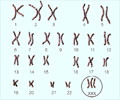Researchers from the Salk Institute for Biological Studies have suggested that a localized DNA damage response at telomeres after replication is essential for recruiting the processing machinery that promotes formation of a chromosome end protection complex.
Telomeres, the ends of linear chromosomes, represent a problem for the control of genome stability and the DNA damage machinery. An exposed telomere could readily be taken for a break and recognized as damage, and thus, have to be distinguished from DNA breaks that initiate a DNA damage response.To prevent the cell's DNA repair machinery from confusing telomeres with broken strands of DNA that need to be repaired, the tips of chromosomes are tucked in and shielded by a phalanx of proteins, forming a protective "cap".
The research team, led by Jan Karlseder, found that several well-known members of the DNA damage response machinery, recruited by the unprotected telomeres, congregate at the tips of chromosomes.
The authors believe that the localization of repair proteins to chromosome ends, and detection of telomeres as damage at this precise time are necessary to trigger the re-formation of a protective telomeric structure.
In contrast to damaged strands of DNA, they hypothesize, the repair process never gets fully underway at telomeres. Instead, the very tips of the chromosomes are looped back, tucked in and covered with telomeric proteins.
The cell tries to fix everything to make sure that the genetic information is safe and complete for the next generation of cells, but in the case of healthy chromosome tips or telomeres, repair would have disastrous consequences.
Advertisement
The researchers assert that fusion breakage cycles scramble the genome over time, and cause genome instability, which is a hallmark of cancer cells, and this demonstrates the importance of telomeres in preserving genome integrity and preventing cancer development.
Advertisement











